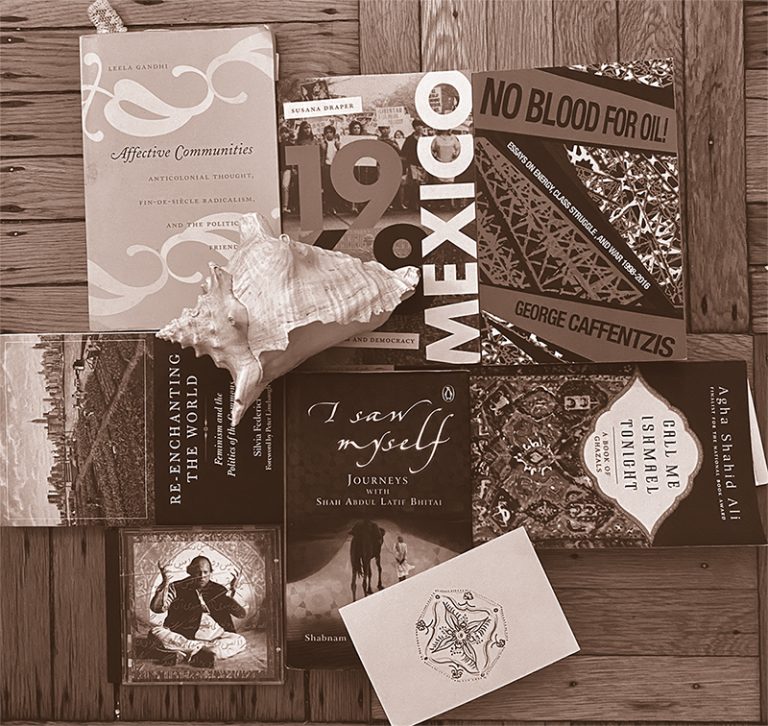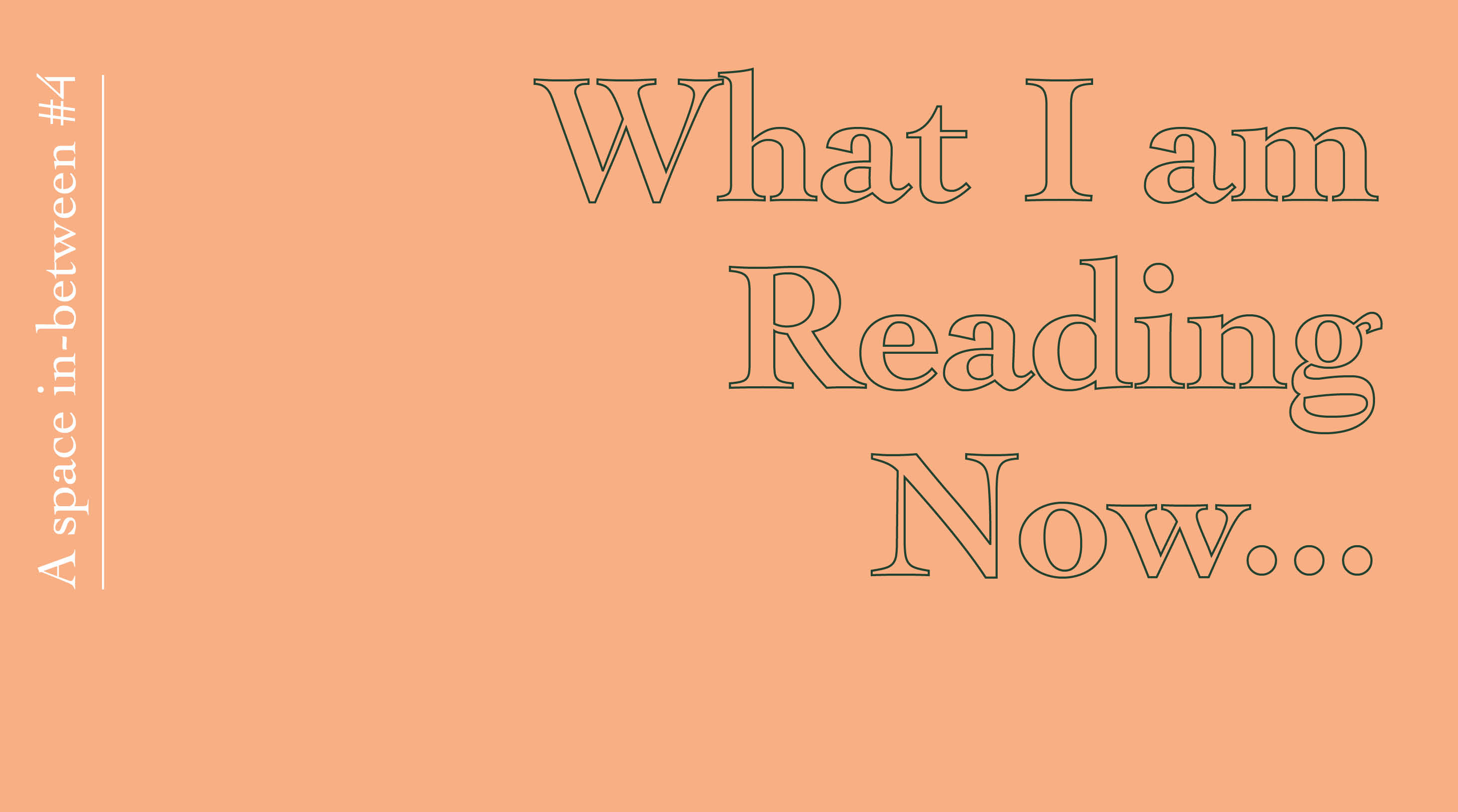What I am Reading Now…
Jesal Kapadia
August 2021
I’m reading this poem now, from I Saw Myself, Journeys with Shah Abdul Latif Bhitai by Shabnam Virmani and Vipul Rikhi, page 200, The Woman’s Voice:
Those who plunge, emerge
That’s how it’s always been
Submerge in the rampant river
And meet with Meher
Water is the element that remembers, holding the frequency of another timeline. What kind of care has been programmed here?
She said: Heat enters just like water. Transformation occurs – stones melt away as rhythm is in play. Healing occurs when care becomes love…by opening up the pathways. When we send signals of care, we’re saying that we’re not going to be harmful. We have to combine pleasure with healing; it’s magical! When you make decisions together, you are communicating, and that’s when the new comes in!
Thank you, Hardip, for the healing collective, for showing us how to read the signs.
I am reading about the transformation of everyday life, from Silvia Federici’s book, Re-enchanting the World, Feminism and the Politics of the Commons, page 175.
Where does power reside? How do we rearrange our daily actions, so that we can transcend the traditional psychological viewpoints that individualize our experiences and separate the mental from the social, so that we can start to heal from the systemic harm?
She said: People have said to leave the oil in the ground. So the fight is to leave the oil in the ground, to make decisions collectively. Below the university, is the commons, the spaces of sanctuary.
We are reading a poem, We thought it was oil, but it was blood, by Nnimmo Bassey. It appears in George Caffentzis’ book, No Blood For Oil! Essays On Energy, Class Struggle, and War 1998-2016, in the acknowledgements section. We are thinking together about which movements are centred on oil struggle today.
As we walk in the park, Silvia and George tell me about Zerowork, the movement of refusal of work. In another one of his books, George starts with a poem by Lao Tsu, page 6, on the usefulness of nothingness:
Thirty spokes share the wheel’s hub;
It’s the center hole that makes it useful.
Shape clay into a vessel;
It’s the space within that makes it useful.
Cut doors and windows or a room;
It is the holes that make it useful.
Therefore profit comes from what is there;
Usefulness from what is not.
Thank you, George, for reading Rumi together, and Silvia, for re-enchanting our community with daily rituals – the long walks in the park, the farmers market and the cooking of the lentil soup, thank you for the Feminist Research on Violence Collective, and for sharing with us what still needs to be read, discussed and written about.
I find this line in my notes…Self-defense is a perspective. I am reading again Jaspal Singh’s, The History of The Ghadar Movement. I remember him reciting this poem by Baba Bulle Shah, when we were reading the Rig Vedas together, tracing the origins of violence:
Meri Bukkal De Vich Chor
Ni Meri Bukkal De Vich Chor
There is a thief in my lap
There is a thief in my lap, my friend
Kihnun Kook Sunnavan Ni Meri Bukkal De Vich Chor
Chori Chori Nikal Gaya Jagat Vich Pai Gaya Shor
Whom should I tell my suffering; there is a thief in my lap
He escaped unknown to me and the whole world knows about it
Meri Bukkal De Vich Chor
There is a thief in my lap
Is it in agriculture? Patriarchy? Nation-state? Where can we be a part of that anti-colonial struggle? We talked about how to never lose the anti-colonial impulse, to constantly engage in an anti-colonial struggle without attaching oneself to any sovereignty, to not historicize anti-colonialism.
Leela Gandhi’s Affective Communities, Anticolonial Thought, Fin-de-Siècle Radicalism, and the Politics of Friendship, is also always on my desk, being read together with, and to friends. Thinking about how to live a non-injurious life.
From our dear friend Susana Draper’s, 1968 Mexico, Constellations of Freedom and Democracy, I’ve been reading chapter 2, page 97, Toward a Fourth Cinema. I recall what I had written before – a cinema of refusal, a cinematic non-form that breaks away from the conditions set by capital, a cinema made entirely of the process itself, that cannot be retained, that disappears and renews itself when recalled, that creates an unforgettable loss, but loss on the autonomous side.
With Avi, I have not stopped reading Gayatri Spivak’s writings. We rehearse her words, millennial cognitive damage, epistemic violence…holding space for riyaaz, this daily practice of restitution, for this much needed ulfat ki bahaar, this spring of friendship among melting church organs and the harmonium. We want a collective subjectivity as a constant practice (thank you, Annie, for putting it this way, and for our imaginary maps), of being together in relation to the text.
What is the time of devotion? Becoming a bhakt, singing the common sorrow, between seva and tequio, (muuch meyaaj, as Valiana taught me how to say it in the Mayan dielect), this is the time of the fiesta. The farmers have been gheraoing* for nine months now. The langar is open and ongoing, no one will go hungry. There is a jinn in the air!
We read again from Shah Abdul Latif Bhitai, One Palace, One Million Doors, Journeys into Kutchh, Chapter One, page 1:
Let’s go, my sweet
To the land of the beloved
Where nothing arises
And nothing subsides
Lets go!
Thank you Shabnam, for planting the beej mantras in us!
And lastly, dear Sophia, I want to read you something from this book that’s in my hand, Agha Shahid Ali’s Call Me Ishmael Tonight, A book of Ghazals. Pick a number – single, or two-digit. I’ll open that page and read the ghazal to you!
*Gherao, meaning “encirclement”, denotes a tactic used by protestors in the Indian sub-continent, similar to picketing. Usually, a group of people would surround a politician or a government building until their demands are met, or answers given.
Jesal Kapadia is an artist living between New York City and Bombay. Her work explores the potential forms of non-capitalist subjectivities. She has been thinking together with different communities of care that have come together to create spaces and situations through which to refuse, re-arrange, retrieve and re-enchant the capacity of art in creating new knowledges and new sensibilities for being together. Practices of commoning, weaving the intelligence of friendship and affection in the connective fabric that allows for removing conscious and unconscious dynamics of patriarchy from our bodies, have been central to these experiments.
Reading
I Saw Myself: Journeys with Shah Abdul Latif Bhitai, Vipul Rikhi and Shabnam Virmani (Penguin Random House India, 2019)
Re-enchanting the World: Feminism and the Politics of the Commons, Silvia Federici (Pm Press, 2018)
No Blood For Oil! Essays On Energy, Class Struggle, and War 1998-2016, George Caffentzis (Autonomedia, 2017)
The History of The Ghadar Movement, Jaspal Singh
Affective Communities: Anticolonial Thought, Fin-de-Siècle Radicalism, and the Politics of Friendship, Leela Gandhi (Duke University Press, 2006)
1968 Mexico: Constellations of Freedom and Democracy, Susana Draper (Duke University Press, 2018)
Call Me Ishmael Tonight: A Book of Ghazals, Agha Shahid Ali (W. W. Norton & Company, 2004)

Please note the views published in What I am Reading Now… are personal reflections of the contributors.
These may not necessarily represent the views of the University of Dundee.
———
Previous Issue: Jemma Desai, July 2021
Next Issue: Rehana Zeman, September 2021
